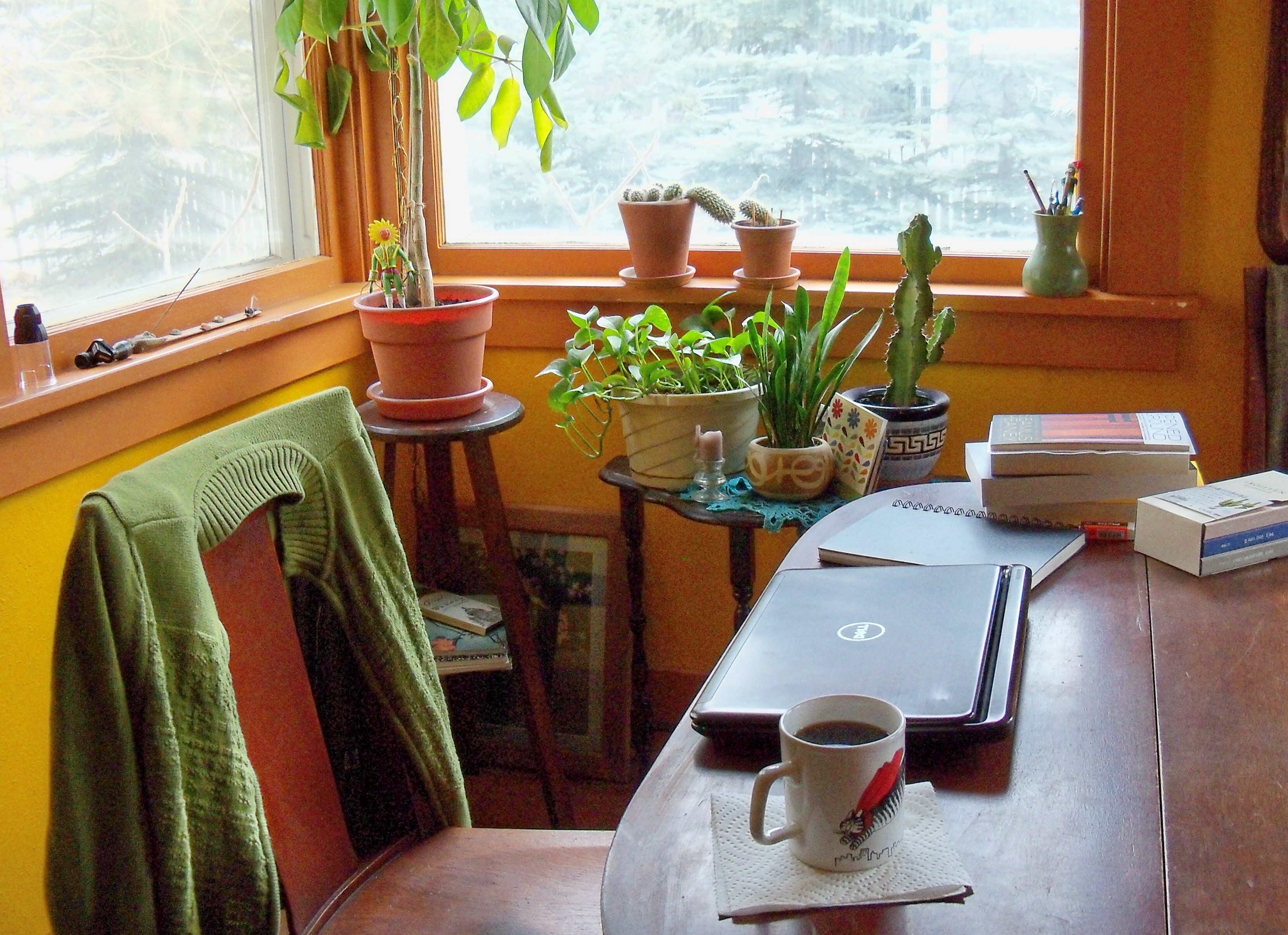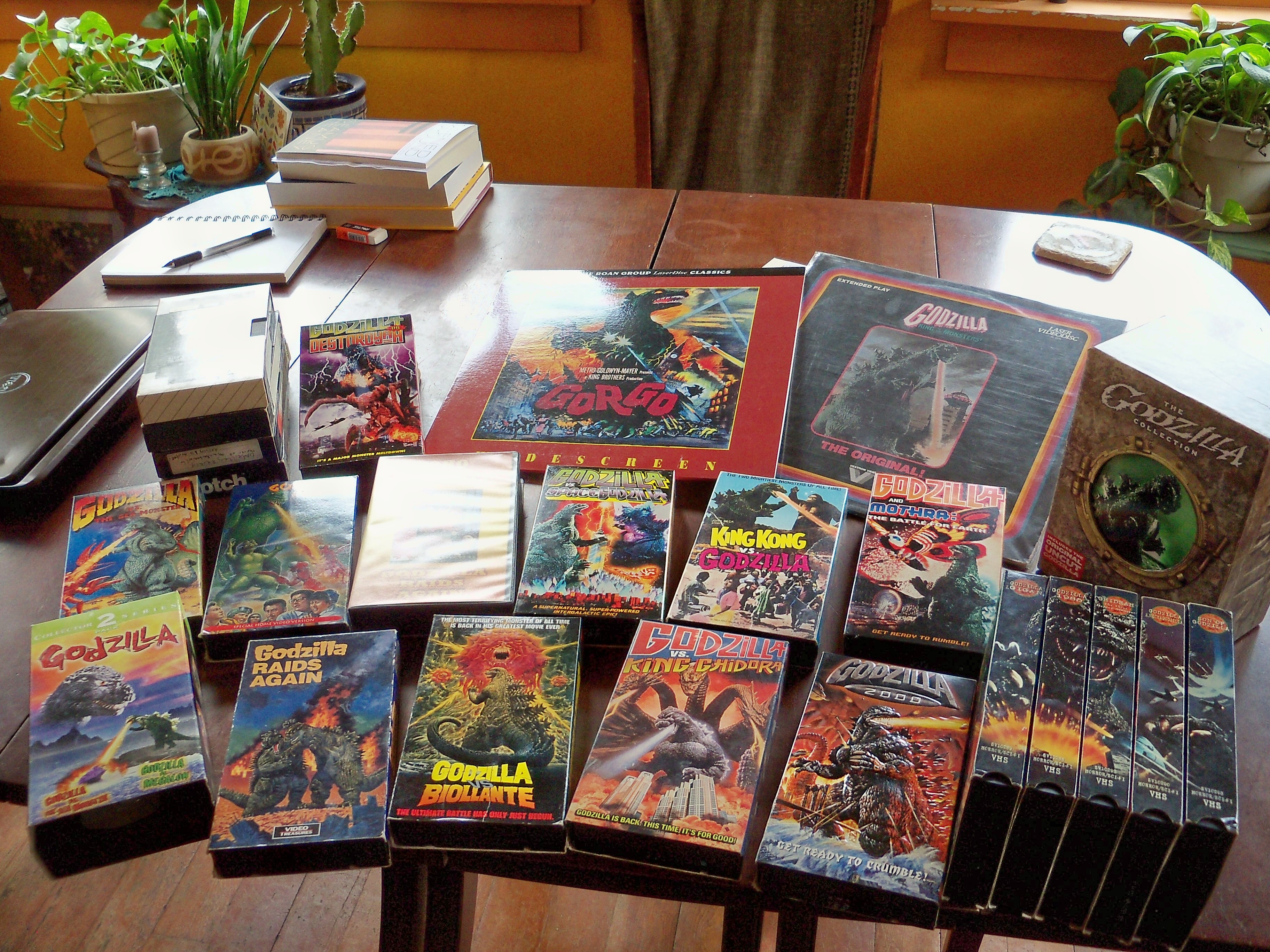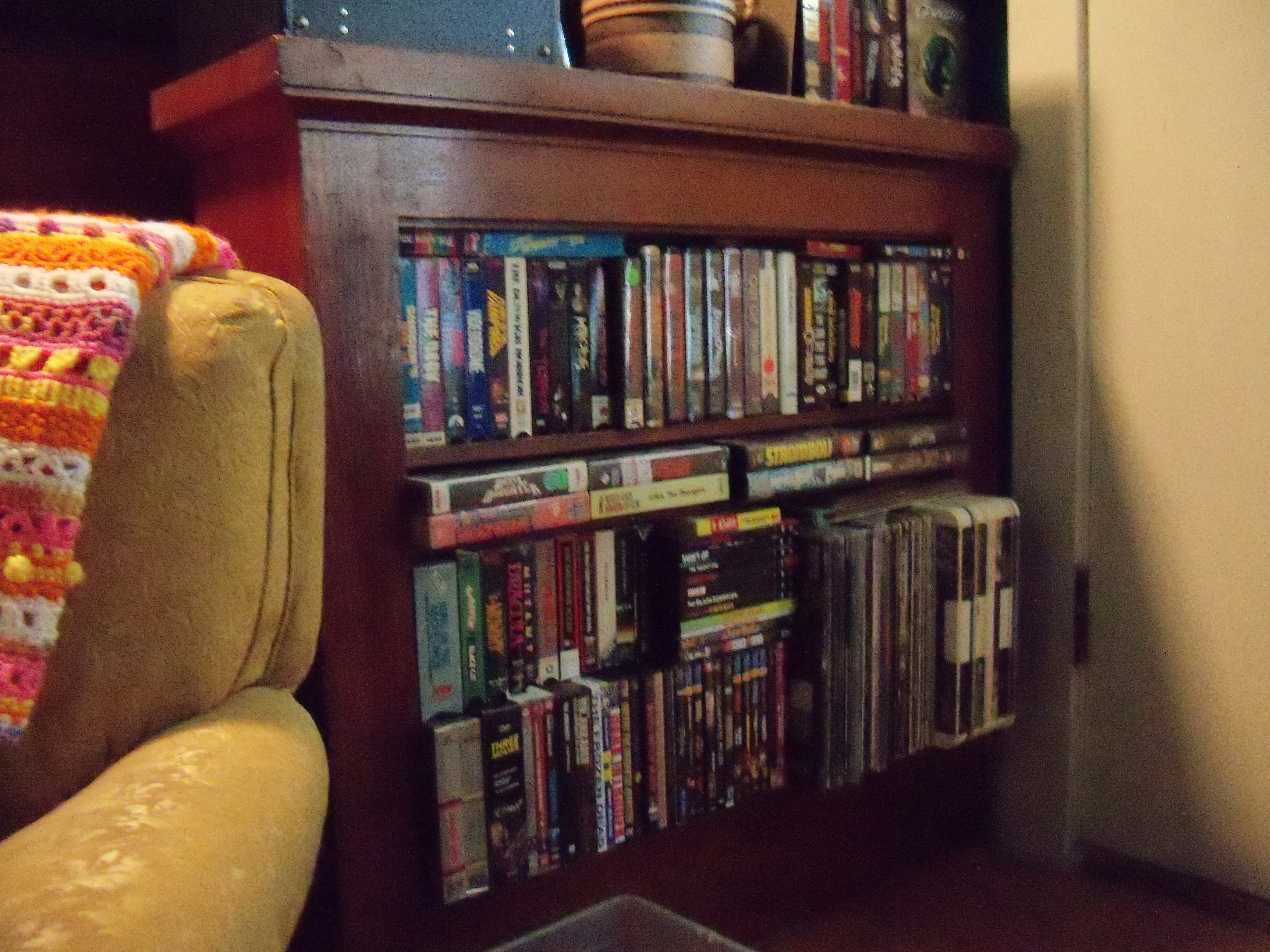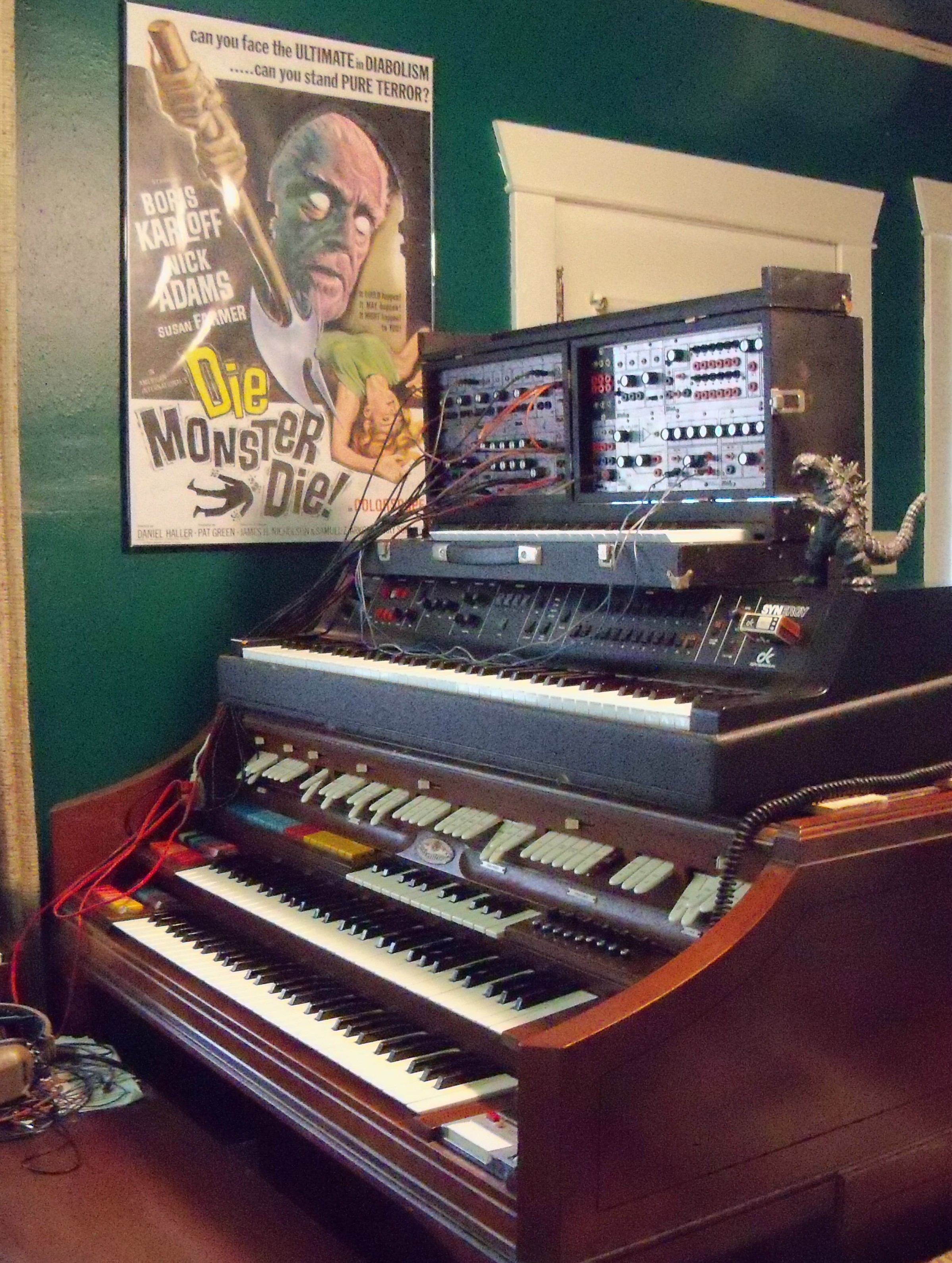Unschooling in the World: Montana to Italy via Godzilla
Deb Lewis, interviewed by Sandra Dodd, late March and early April, 2014
Deb Lewis, interviewed by Sandra Dodd, late March and early April, 2014
Deb Lewis lives with her husband, David, and her son, Dylan, in Deer Lodge, Montana. Through the wonders of electronic communication, people all over the world have read Deb's writing on unschooling.
Sandra: Deb, did you find out about unschooling from books or from the internet?
Deb: Books at first. John Holt. And then I subscribed to Growing Without Schooling magazine. And then I found your column in Home Education Magazine.Sandra: Good for the internet! Good for other unschoolers. Your writings have inspired many other moms. Not many people get to do that without leaving town.David and I had talked about homeschooling before Dylan was born. We had neighbors in those days who homeschooled, and their kids were so sweet and smart and charming, it looked like a good idea to us. So when Dylan was still very little I started looking for information. I found a box of John Holt books, and a couple of copies of Growing Without Schooling magazine at a library book sale.
Then when Dylan was four years old he was adamant about not going to school and that helped us make up our minds. Sometime after that I found your column in Home Education Magazine. We officially started in 1999, when Dylan was seven years old, compulsory school age in our state. That was also the year we got a computer and internet access. Modernity had arrived at the Lewis household!
Deb: I love the internet! For a family like ours, who couldn’t afford to travel much, the internet is wondrous. It lets us see, hear, and learn about anything we want. We can watch a volcano erupting in Costa Rica, penguins doing penguin things in Antarctica, and see Earth from Saturn’s orbit all without leaving town, or navigating the asteroid belt. I’m a fan!Sandra: Did you and your husband like school yourselves?
Deb: No. David was happy in the early grades, but then his family moved. He went from a place with a lot of diversity and acceptance to a cliquish, conservative place. He remembers a few bright moments in high school, but not many. I got in trouble my first day of Kindergarten and things never got better. School was not a good fit for me. I was a skeptical and nonconforming child. So, when we thought about what Dylan might miss if he didn’t go to school, we knew at least some of it would be better to miss.Sandra: Have you been "a writer" in your life? Poet? Lyricist? Your facility with words impresses me, always, and makes me laugh. If you weren't a writer before, you surely are these days!
Deb: You’re very kind! I don’t think of myself as a writer. Punctuation is mysterious. I spilt infinitives, and preposition the ends of my sentences, and worse. But I do put words on paper. I write very bad poetry. I wrote stories for Dylan when he was little. I write love notes to my husband, and to birds. I keep some kind of deranged journal of alternate reality.But I love thinking and talking about unschooling, and any unschooling writing is out of a desire to learn more, and possibly help someone else if I can, the way so many have helped me. I hope at least some people are able to overlook my technical failings and find something useful in what I try to communicate.

Deb: Yes. Life is full of joys and sorrows. Both can change you, stay with you forever, shape your view of the world, and your relationships with others. If some sorrows can be avoided, that’s good for health, and learning. Some of the lasting injuries of childhood can come from school experience. Most children don’t have a choice about school or about what happens to them there. We wanted Dylan to have as much choice as possible in his life. At any time he could have chosen school. He didn’t, and that was fine, and joyful!

Deb: Eight years it too short a time, darn it. Nineteen more countries have abolished corporal punishment in the home since 2006. I don’t know whether those laws are enforced, but it gives me hope! Things are generally better for children whenever things are better for adults. It’s easier to be more considerate and generous when you have all you need yourself. So I think the long term trend in any stable democracy will be improved conditions for children.Sandra: Someone wrote of you recently, "Your writings make me laugh and think in a serious way at the same time. Not many can do that." I've collected your writing for years, and one of my favorite things is a list of crimes that can't be blamed on TV or video games. It's not that the facts were amusing, but the comparison to present panic and blame that made it so striking.There is a lot of new information about the minds of babies, and about how babies and toddlers learn, but that information is slow to translate into wide acceptance. There was that great experiment a couple years ago by One Laptop Per Child. They left tablets in two villages in Ethiopia, just dropped them off, no help or instructions, and the kids figured out how to use them and were learning all kinds of new things. Still, some experts are afraid of “screens,” and lots of educators don’t want to admit kids can learn as much (or more!) playing with a tablet as they can in a classroom. It will be a long time.
Unschooling is in the news more, but I think that increases confusion for many people. One thing that will make a difference to broader acceptance of unschooling is the families. As more people have positive experience with kids who didn’t go to school, and with smart and responsible unschooling parents, it will seem less crazy. Another is research. As the science comes in increasingly in support of play as learning for young children, and meaningful self-selected work and experience for older kids, more parents will choose natural learning over school's outdated drudgery. Gradually, gradually.
Deb: Humans are superstitious, and well being and flourishing can seem random and mysterious. Having something to blame and avoid probably feels comforting. But calm rationality is better for learning than panic and blame.Sandra: I like it when you poke illogic in the eye a bit.
Deb: I like to poke stuff. I’m not immune to illogic, so I’ve learned to question my thinking and suspect my motives.Sandra: If I could describe all your writing in just a few words, it might be "Peace, humor and scary monsters." Dylan's life has involved a lot of Godzilla and that ilk. Scooby Doo and Godzilla.
Deb: Yes, a lot of Godzilla, beginning when he was very little. And then any movie with a monster, or any book about monsters. And then all kinds of horror and science fiction. Godzilla was the gateway monster, though, and it started with a movie marathon on television. I couldn’t have guessed then, when he was three years old, that he would find a lifetime of happiness in horror! And I didn’t know then that his love of monster movies would lead to learning to read and write, finding authors, making connections to other cultures, (and more movies and authors) and connections to music, theater, poetry, folklore, art, history... It turned out to be this rich and wonderful experience he might have missed, and I might never have understood if I’d said no to TV, or to Godzilla, King of the Monsters.

Before Dylan was reading or writing really well, he’d meticulously copy the titles and dates of movies he wanted, and request them from interlibrary loan. All that writing, and all the time spent watching movies with subtitles helped him read and write better. I remember the feeling of joy and wonder, mixed with some sadness and loss when he didn’t need me to read movie subtitles to him anymore. I learned so much about learning.As he got older, but before we had Netflix, and before a lot of the movies he wanted were widely available, we searched eBay. We set up a PayPal account so he could easily buy movies he found. Many of those movies weren’t available on dvd but he found them on VHS or Beta or laser disc. Many came from other countries. That was a lovely world of discovery, learning about different media formats. We bought an all region dvd player and vcr, Beta vcr, video disc player, and laser disc player. There was so much to learn!

He lives with us, which is lovely, and he plays keyboards, and is learning to play the Native American flute. He is learning to repair ancient television sets, which he collects. He's interested in photography and film making. Has made some short films. Experimented with stop motion photography, and is interested in developing his own pictures. He plays piano and the organ and synthesizer well. He's an avid reader, currently immersed in Russian history.Sandra: You wrote recently that you regret not having traveled more. I'm glad you came to speak in Albuquerque, thank you again. And I've used some photos on Just Add Light and Stir that your son Dylan took in Stromboli. Where else did he go on that trip?
Deb: I do wish we’d traveled more as a family when he was younger. We had camping trips, and a trip to Yellowstone. We went to the Grand Canyon, and parks and monuments along the way. We went to Colorado, Texas and Arkansas to visit friends and family. He and I went to an unschooling conference in Boston when he was twelve, and he traveled to Alberta with my sister when he was fourteen. We spent a few weeks on the Oregon coast when he was sixteen, and there were road trips around Montana.When he was nineteen he flew to Europe, alone. He went first to Germany, where he visited cathedrals and their pipe organs, to Poland and the Czech Republic, Switzerland and then, Italy. Italy was the real reason for the trip. He spent time on Stromboli, and felt so at home there I thought he might not come back to us! I was worried he’d starve, since he’s vegan and I’d heard there is no food without meat in Germany. But he was fine. There were fresh fruit stands everywhere he went in Italy. Even on Stromboli where I thought he’d find only fish, and fiery death by volcano, he found food options galore.
His desire to go to Italy started with Italian films. He learned Italian because of his love of Italian movies. I didn’t know when he first found Italian horror movies, and we were watching zombies and demons and mad slashers, that it would lead to the whole world of beautiful Italian cinema, or learning a new language, or this great adventure when he was nineteen.
I can write more, if you want, about places he visited. He went to the holocaust memorials in Germany, which is fascinating but also horrifying and sad. He went into Austria by mistake without the proper train pass but got out again without causing an international incident. He slept one night in the train station in some little, everything-closes-at-dusk town in Switzerland, but had better luck the rest of the time.Sandra: He learned Italian, in Montana?
Deb: Yes! Through a Pimsleur course, and watching Italian movies and Italian television online. It’s not exactly immersion learning, but it’s as close as one can get in a small, rural Montana ranching community.Sandra: When he was in Italy, was his Italian useful in person?
Deb: He did get to use it! But he said sometimes when people knew he was American they wanted to speak English. Maybe he’ll get a chance to go back and try again!Sandra: What besides humor, logic, love and time do you credit for this environment you created for him?
Deb: I credit the things I learned in unschooling discussions, those profound ideas about relationship building and looking directly at your child. We looked at Dylan and at what he wanted. We adored him, and it seemed natural to try to help him reach his goals. We tried to do the things that would build an easy and trusting relationship. We tried to say “yes” when it was possible, tried to find the possibilities when “no” would have been more convenient. We were sometimes limited because of income, location, and space, but we tried to be creative. When we got into the habit of thinking creatively we were often able to navigate obstacles. Once we had experience navigating a few obstacles, we got better and bolder about facing the next one, or ten. And when you see that following an interest leads to so much joy and learning, you have the motivation to do what you can to follow the next interest. It’s beautiful in a mushy kind of way that would probably not have the approval of monsters.Sandra: Thank you for this exchange, for being the star of a chat while I was in Australia, and for all the writing you have done to help other unschoolers over the years.
Deb: Deb: Thank you for helping us have such a nice life!
Deb Lewis lives a happy unschooling life in Montana with her husband David and son Dylan. She's a part time floral designer, painter, poet, gardener, trampoline bouncer and bird watcher and a full time unashamed idealist.
Sandra Dodd has spoken at HSC conferences, and lives in Albuquerque.
[Sandra note: In early 2010, someone sent me an e-mail assuring me that tv was evil for children, and said if he/she knew me and my children that "I could point out plenty of things they did as a result of watching tv." I shared the note with the Always Learning list, and Deb Lewis wrote this:]
Why so eager to find rotten things festering inside other people?Dylan achieved the rank of brown belt in Karate *and* Tae Kwon Do; five years of study and hard work and he got interested in martial arts from watching old Japanese movies. He saw those movies on TV because, well, they're old, and not shown in theaters (at least not around here) anymore.
He's learning Italian and he got interested in that from watching Italian TV on the web and from watching Italian horror movies on TV. (same deal, not shown in theaters around here.)
He got interested in digital music from music he first heard on Television and now owns three synthesizers and plays very well, has learned a bunch about electronics.

He got interested in playing the organ from watching a movie on TV, "The Abominable Dr. Phibes." 🙂
He now plays the organ really well, no lessons, just plenty of good Phibes.
(I make myself sick)As a direct result of watching TV he learned how to use an old 16mm camera and to make stop motion films. He has a better camera today and is still making videos and taking really beautiful photographs.
As a result of watching TV he's written several stories and screenplays.
I can't begin to count the number of books he's read because he first saw the story on TV on some old Twilight Zone episode or saw a movie based on a short story or novel. Authors like Richard Matheson, August Derleth, H.P. Lovecraft, Henry James...
I have, a couple different times, tried to write all the things Dylan has learned as a result of watching TV. I haven't been able to finish. There's just too much.
Deb Lewis


-Monstermania

Other Interviews and HSC articles

More by Deb Lewis